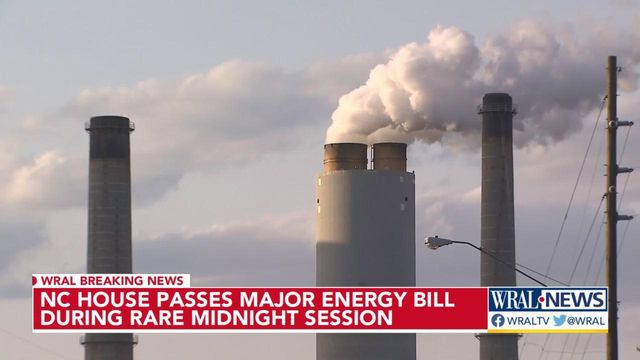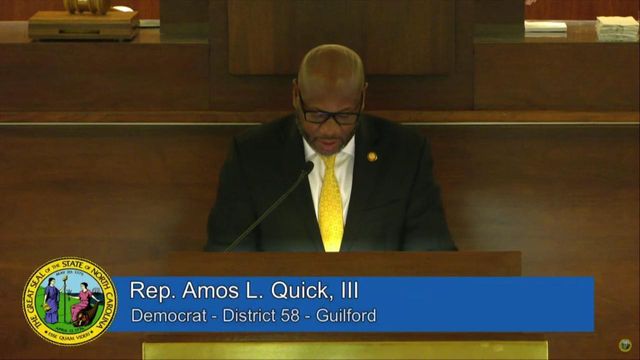NC House passes major energy bill during rare midnight session
A bill charting a decade or more of energy policy in North Carolina passes on a close vote.
Posted — UpdatedThe bill, a major priority for regulated monopoly Duke Energy, passed 59-47 after the House gave the measure preliminary approval Wednesday night on a 57-50 vote.
House rules require two votes to move the bill on to the state Senate, and because Democrats objected to holding the votes one after another, the House's Republican leadership opted to satisfy the next-day requirement that objection triggered at 12:01 a.m.
There was no additional debate in the early Thursday session. The bill picked up a couple of yes votes, but some members had to change their votes from yes to no after the vote was taken, having mistakenly voted yes.
Late-night sessions are unusual, but not unheard of, particularly on controversial issues. House Speaker Tim Moore said some lawmakers who voted yes Wednesday night have travel plans Thursday and wouldn't be available for a daylight session.
Gov. Roy Cooper has all but promised a veto for the measure, taking the unusual step Wednesday of reiterating his problems with it in a statement.
"The House Republican energy legislation as currently written weakens the Utilities Commission’s ability to prevent unfair, higher electricity rates on consumers in the short run," Cooper spokesman Ford Porter said in an email. "In the long run, this bill falls short on clean energy, which will create jobs and contain costs. The governor encourages legislators to oppose this bill unless important changes are made to fix these significant problems."
There's a ways to go before the bill hits Cooper's desk, with the state Senate the next stop. But if Cooper does veto it, bill supporters don't have the numbers to overturn it. Wednesday evening's vote broke mostly along party lines, with Republicans for the bill and Democrats against, but there was some crossover: Two Democrats voted in favor of the bill, and five Republicans voted against.
Moore, R-Cleveland, said the move "really shocked folks."
"That's a big deal," said Moore, concerned over increased costs a carbon cap-and-trade program might add to electricity generation.
Moore said the RGGI amendment also helped locked down yes votes from some of the Republican caucus' more conservative members who don't like parts of House Bill 951.
He swatted aside an amendment attempt from Rep. Larry Strickland, R-Johnston, who has asked for months that the legislature authorize a study of a deeper regulatory overhaul that would let electricity wholesalers compete against Duke. When Strickland tried to tack his bill to that effect into House Bill 951, Moore ruled it out of order.
The speaker pressed hard for the bill Wednesday, and he told WRAL News that it addresses a lot of difficult issues pending in the state. Natural gas "makes sense" as an energy source as the state moves away from coal, he said. He also noted corporate takeover efforts Duke faces, including one that would likely break up the company, which is headquartered in Charlotte.
That would have "serious economic consequences" for North Carolina, Moore said. Asked whether that means the bill is a financial boon for the company, as its critics say, he said it's more about charting a course.
"I wouldn't classify it as a financial boon, but ... I think this is a way of getting some certainty," he said.
Democrats made a number of arguments against the bill, with Rep. Becky Carney, D-Mecklenburg, focusing on its complexity and the haste to vote now. The measure runs 48 pages and is dense with regulatory jargon that, in several places, takes authority away from the North Carolina Utilities Commission, which regulates Duke and other power providers.
“Please think hard," Carney told her colleagues on the House floor. "Have you read it enough … that you can go to those ratepayers … and you can explain to them why you voted yes?”
Related Topics
• Credits
Copyright 2024 by Capitol Broadcasting Company. All rights reserved. This material may not be published, broadcast, rewritten or redistributed.





